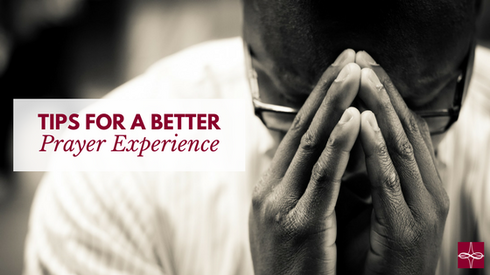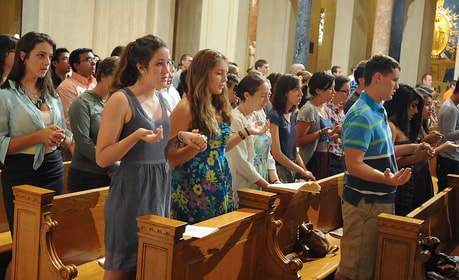|
Recently, my husband and I attended a virtual Catholic Marriage Summit called, “Joyful Ever After.” Several of the speakers mentioned the importance of cultivating the virtue of believing in your spouse’s best intentions rather than assuming ill will when a perceived grievance is committed. I thought back to a time when my husband and I were dating long-distance. He texted me that he would be arriving late to see me, which was very unlike him. I was a bit sassy in my response. What I didn’t realize at the time was that he was late because he ran into traffic while buying me a surprise bouquet of flowers. A podcast I listen to addressed this same predicament when we interpret our children’s actions before we know their true intentions. The mom on the podcast shared how terribly she felt after becoming upset with one of her children for making a mess of crafting supplies only to find out her child brought out the materials to make her a love note. Encounters like these provide us with opportunities to choose love. Making up stories in our minds that may not be—and most of the time are not—true does more harm to our relationships than good. Assuming good intentions from our spouses, family, friends and co-workers allows us to foster and strengthen relationships. Doubting someone else is a way of protecting ourselves. God is the one who gives us courage to trust others and give them the benefit of the doubt. Being less defensive makes others more receptive. Opening ourselves up to another allows us to share the hope and joy of the Gospel. We become more likeable, less distracted by imagined problems, focused on the actual issue, and are overall happier. After all, God gives us a second, third, fourth and ultimately infinite chances in response to our shortcomings. As James 2:13 says, “For the judgment is merciless to one who has not shown mercy; mercy triumphs over judgment.” Training our minds to think of others and the best intentions they have can both help us and improve our relationships. In many occasions, the person we are interacting with may be reacting from a previous interaction that overflows into our relationship with them. By keeping an open mind without judgement, we allow the Holy Spirit to enter our hearts so that we may reach out to the other with empathy and love. This serves as a reminder to us of our own humanity and imperfection. Believing in another person’s best intentions is an act of faith. To foster this line of thinking in my own marriage, every day I try to share something I’m thankful for about my husband. I try to think about this during prayer as well to help develop gratitude. When I don’t understand something that my husband is doing or has done, I try (very hard!) to ask open-minded questions in order to open dialogue instead of shutting the conversation down or arguing. Some other ways we can seek to see the best intentions in others are: asking for clarification, listening to what’s being said rather than waiting to share our own thoughts, and refraining from editorial comments that could aggravate the situation. During these unusual times, we could all benefit from more compassion and grace. Let us open our hearts and minds to seeing the best in others. For more resources on Marriage and Family, please click here. For more resources to accompany you through this time of COVID-19, please click here.
1 Comment
O God, Thou art my God, I seek Thee, my soul thirsts for Thee; my flesh faints for Thee, as in a dry and weary land where no water is. -Psalm 63:1 There are seasons in the spiritual life in which you feel parched, as if you’re wandering the desert without refreshment. Silent reflection is filled with distraction. Prayer seems awkward, difficult, or boring. Your heart feels lifeless. Lately, despite my attempts to find escape, this sums up my prayer experience. It doesn’t matter that I infuse my days with the Mass readings, a Rosary, Catholic podcasts, or spiritual books. Right now, it seems so much easier to turn on a show or scroll through social media than to pray. Any time I resolve to do the latter, all the things I need to do bombard my mind, or the texts and notifications come in streaming. At Mass, I hear the beautiful words of Scripture and the homily but feel hollow in the pew. Am I a bad Catholic? Is something wrong? During times like these, many people of faith get disheartened. They think they have done something wrong in the spiritual life, that God has abandoned them, or that their faith must not be relevant anymore. But all people of faith will experience this to some degree at one point or another! It is often hard to trudge through when warm feelings are absent and prayer requires intentionality and effort, but these times in the spiritual life can be the most fruitful of all. Our hearts can grow cold and tepid for two reasons: either we’ve slackened in the spiritual life and slowly let the cares of the world take over – like the weeds that choke out the good seed in the parable – or God is calling us to deeper faith and growth. If it’s the latter, this is often a time of spiritual maturation that deepens our faith and love. We choose to cry out to God in prayer not because it makes us feel good or holy or satisfied, but because we trust in God and love him despite how we might feel. We’ve often heard that love is a choice, not a feeling. Therefore, when feelings are absent, God is inviting us to choose him with a love that is selfless and trusting. The feelings that are lukewarm, indifferent, or distracted are part of the spiritual dryness St. Ignatius of Loyola called “desolation.” According to St. Ignatius, there are moments in the spiritual life of both consolation and desolation. In times of consolation, we feel especially close to God, find prayer easy, fulfilling, and natural, and have peace and joy. I remember one time talking to a priest in spiritual direction who asked how things were going spiritually. I told him I almost felt guilty because all was going smoothly. He chuckled and told me to enjoy this time of consolation because it wouldn’t last forever—advising me to write down my feelings and spiritual observations as something to look back on in times of dryness or sorrow. A quote attributed to St. Philip Neri sums up this ebb and flow: “As a rule, people who aim at a spiritual life begin with the sweet and afterward pass on to the bitter. So now, away with all tepidity, off with that mask of yours, carry your cross, don’t leave it to carry you.” How can you carry your cross during this time? Below are some tips to reinvigorate your faith and get you through this time of spiritual dryness.
It is important if you feel indifferent to your faith right now not to give up. I encourage you to re-double your efforts in prayer, seek help from your community and the saints, and persevere. Know that this is a completely normal phase of the spiritual life, that even the saints felt arid at times, and that you are not alone. This Lenten season, I’m trying to be intentional with my prayer. In the Gospel today, Jesus teaches the disciples to pray the Our Father. When I read this passage to my students, they were really excited to make the connection to Jesus’ teaching and to a prayer some of them had heard before. Their little faces lit up and hands shot into the air to share about their experience with the Our Father.
In a 2016 homily, Pope Francis explained that the concept of “Father” in the Our Father is the cornerstone of prayer, for it gives us our identity as sons and daughters of God and as a family. Prayer is a way to connect with God, talk to him, and deepen our relationship with him. In prayer, Pope Francis said that if we do not begin “with ‘Father’ and with the awareness that we are children and that we have a Father who loves us and knows all of our needs,” we can sometimes find ourselves in our most vulnerable place: alone. It can be hard to be open and listen for God’s voice in the midst of worrying about ourselves and our concerns. This Lent, I invite you to use prayer to help deepen your understanding of your identity as the son or daughter of God and to put aside distractions and focus on Christ. In prayer, we can discover a deeper sense of self and of others. We can also take a moment to consider our failures and better understand God’s forgiveness. In the Our Father, we ask God to forgive us and pray that we can find strength to forgive others. That strength can be found in the Sacrament of Reconciliation and in making amends to those whom we have wronged. This deepens our relationship with God and with others. Pope Francis continued, “If you go to pray and say only ‘Father’, thinking of the One who gave you life, who gives you your identity and loves you, and you say ‘our’, forgiving everyone, forgetting offences: this is the best prayer that you can make”. Throughout Lent, I want to deepen my prayer life and model for my students and my husband that God is truly at the center of my life. During Lent, I’d like to challenge myself to sit in the chapel some mornings before school starts and pray in silence before God. I’d also like to plan my morning around a daily Mass. Throughout Lent, I will look to the Our Father as a centering and reflective prayer. Jesus taught us to pray with it, and I intend to use these simple but transformative words to guide my life. Just as my students continue to learn about prayer, I too will continue to allow myself a chance to start over and prepare my heart for God’s love this Lent. As we continue on our Lenten journey, I invite you to reflect on the following questions asked by Pope Francis in his homily: “Do I see God as Father, do I feel that He is my Father? And if I do not feel that He is, do I ask the Holy Spirit to teach me to know this? Am I capable of forgetting offences, of forgiving, of letting things go and asking the Father: ‘they are also your children, and they treated me badly, please help me to forgive?” For more Lenten and Easter resources, please click here. Recently, I experienced the end of a long and stressful month filled with travel. I was in and out of airports and cabs while working late on wonderful projects with talented people. Although I enjoyed the opportunity to share my time and gifts with others, I was exhausted physically and spiritually. The constant movement made maintaining a meaningful prayer life difficult. After coming home from my travels, I have worked hard to get back on track with my personal prayer and grow deeper in my prayer life. As I reflected on my own struggles, I began to think of ways to make a prayer routine easier. Here are some tips I came up with. I hope they help and work for you as well! Disconnect: We live in the 21st century. It is very difficult to totally shut off from the world. We are constantly being pulled away from prayer by the plethora of available information and the digital world. The majority of us are connected through some form (and, more likely, many forms) of technology and social media. Challenging ourselves to step away from the noise is important for cultivating a healthy prayer life. Even Jesus had to take time away from everyday life to pray (see Luke 5:16, Matthew 4:1, Matthew 14:13). Let us learn from Jesus and remove ourselves from the world from time to time, maybe for a weekend retreat or just for a few moments. Make the effort to be alone with Christ. Be Intentional: How often do we squeeze a daily prayer in at the end of a long day? Is prayer usually an afterthought or the core of our spiritual life? Our prayer life can be so much more fruitful if we intentionally set aside some time each day for the Lord. I have only been married for 2 years, but something tells me if I only spoke to my wife a few moments at the end of the day, our marriage wouldn’t be as strong as if we intentionally set aside time to be with each other. Look at your schedule to see where and when you can best include some time for prayer and reflection. That time will become invaluable as you grow in your relationship with Christ. Serve: Sometimes we only think of prayer, or speaking with God, as attending Mass or going to Adoration. Although those are fantastic places to start and continue meeting the Lord, we can also find Christ in our encounters with our brothers and sisters. Look for opportunities to serve at your local parish or diocese. Through these experiences, we have the opportunity to connect with Christ in a new way by helping others. Once a service project or event is completed, do not just put that experience up on a shelf. Reflect on what that experience meant. You will not only learn more about yourself, but also about how Jesus may be calling you to grow in your faith journey. Having a good, meaningful, and joyous prayer life isn’t something unattainable, reserved only for priests and consecrated religious. It is something that we not only we long for, but that is also willed by God. The Lord wants to be in an active relationship with us. Let us be open and active in keeping God in our everyday lives by cultivating a regular prayer life. Questions for Reflection: What are some ways you can incorporate prayer into your daily routine? Is prayer something you squeeze in or is it integral to your daily life? For more information on developing your spiritual life, we invite you to visit our Prayer and Catechesis Resources page by clicking here.
A couple weeks ago, I placed a breakfast order at my neighborhood Dunkin’ Donuts drive-thru. When I went to pay and pick up my to-go bag at the window, the cashier said it was already paid for. I must have looked bewildered as the cashier proceeded to explain that a woman in the store had already paid for my meal. I was overcome with such gratitude and happiness. I immediately offered up my thanks to God and prayed for the woman and her intentions. The rest of my day was so bright and joyful because I kept thinking about the woman who showed such generosity to me. Later, I could only think of how to repay the woman’s kindness by doing something generous for another person, an act known as “paying it forward.” Since this event, I’ve been to Dunkin’ Donuts twice and no one has been behind me in the drive-thru line for me to be able to pay it forward (or backward, rather). Each day, I feel as though I have a debt that is yet to be repaid. I was sharing this feeling with a friend when she said how the feeling is similar to when we finally understand Jesus’ immense love for us in his crucifixion. Our debt to God can never be repaid. Psalm 116:12 says, “How can I repay the Lord for all the great good done for me?” We have the answer in verse 13: “I will raise the cup of salvation and call on the name of the Lord.” There is nothing we can give to God that he doesn’t already have. However, we can give our thanks to him for the graces he has bestowed upon us and ask for more grace so as to show him our desperate need for his infinite love and resources. The grace God gives us wouldn’t be grace if we were able to give it back. In 1 Corinthians 15:10, Paul says, “But by the grace of God I am what I am, and his grace to me has not been ineffective. Indeed, I have toiled harder than all of them; not I, however, but the grace of God [that is] with me.” Our faith in God is what compels us to act out of goodness for others. These acts of kindness are our ways of being proactive in responding to God’s generosity and love for us. In the parable of the talents (Matthew 25:14-30), Jesus tells the story of a master who entrusted his possessions to three servants. The servants who were given five talents and two talents went off to make more talents. The servant who was given one talent buried it. The master rebukes the servant who buried his talent because he hid it from others. The master says, “For to everyone who has, more will be given and he will grow rich, but from the one who has not, even what he has will be taken away” (Matthew 25:29). This parable reminds me that God has entrusted us with gifts, be they monetary, skill-related, or time-related. We are to share these gifts with others, and in return for being good stewards of God’s gifts, he will provide us with more gifts. A friend of mine mentioned to me that even as she gave a little of the earnings she made from her first paycheck to God in the form of tithing and good deeds to others, she noticed that she always had enough for essential needs. Over the course of time after monthly charity budgeting, she earned a raise and could give more to charity while maintaining her needs. The idea of paying something forward to someone else is most powerful when we share with those whom we do not know or wouldn’t naturally help. We have a responsibility to show God’s love to our fellow human beings by loving them through service, random acts of kindness, sharing God’s word, and in our actions and words. We have learned the importance of this already through the Golden Rule: “Do to others whatever you would have them do to you” (Matthew 7:12). In the meantime, I’ll continue to look for opportunities to pay it forward. Many hope to journey through Lent having experienced a true transformation in their spiritual life. But sometimes, innocently enough, we don’t take full advantage of our time when we give up something that we have every intention of picking right back up (or indulging in on Sundays). Don’t get me wrong—it can be spiritually edifying and purifying in a lasting way to give up normally enjoyable things (e.g., chocolate, Netflix, alcohol) for just a period. A few years ago though, inspired by centuries-old Catholic theology I learned from some introductory college classes, I tried a different approach to Lent. I found the saints were all talking about Lent as a time to grow in virtue. In the Catholic tradition, a virtue is “an habitual and firm disposition to do the good” (CCC 1803). You might think of virtues as character traits that describe a holy and happy life. Here are some of the “human virtues” that play a prominent role in the Catholic life: The Cardinal Virtues: Prudence, Temperance, Justice, and Fortitude. The Cardinal virtues have a special role in the Catholic tradition, and make possible other important virtues like… The Capital Virtues: Humility, Generosity, Chastity, Meekness, Temperance, Kindness, and Diligence. The seven Capital virtues are meant to counteract the Seven Capital Vices, or ‘Deadly Sins.’ One of the best teachers about virtue is the famous Dominican St. Thomas Aquinas, who lived from 1225-1274. Growing in virtue helps us grow more like Christ, so we can, in St. Thomas’ words “recover the completeness and distinction of mind” that gets lost through sin and vice (Meditations for Lent, 22). Lent is also a great time to focus on developing a virtue that has become weak in your life. St. Thomas Aquinas teaches that we grow in virtue by forming good habits and receiving grace. Habits are important because they tend to shape our overall character and moral decision-making process, and therefore have a role in our relationship with God, others, and our self. Lent is an excellent opportunity to form new habits that we can then carry forward into Easter and beyond. In order to grow in virtue, we need to develop good habits, and we develop habits through repeated actions (See also CCC 1810). Repeated good action --> Good habits --> Virtue It’s a little simplistic here, of course. And although it’s a simple concept, admittedly, it’s not always easy in practice. Building good habits can be difficult because we often find ourselves already stuck in bad habits (vices) that may be tough to break. That’s why giving something up isn’t always enough; we need to replace it with a good action. It also takes focus and developing discipline, which is exactly what we see in the desert experiences found in Scripture as well as the Early Church (CCC 1434). Interestingly, contemporary psychology reinforces to some degree what theologians have understood about habits. Scientists report that it generally takes between 21 and 66 days to turn a new behavior into a habit. So over the forty days, why not consider choosing a Lenten practice that’s not just temporary, but one you hope will stick? Take some time in prayer before Lent begins to identity one specific virtue that will help you draw closer to God. Then, consider some actions can you take toward growing in this virtue. Think in terms of the traditional Lenten practices of prayer, fasting, and almsgiving. For example, fasting can help transform habits associated with our appetite for things, the virtue of temperance. An appetite doesn’t necessarily mean food or drink, though it may. It really covers anything we use to fill our mind and body, like TV and the Internet. Lent is a desert experience where we learn to pursue and subsist on the Word of God rather than our perceived needs. Or maybe you want to grow in the virtue of kindness. Commit to going out of your way to doing one kind action each day by giving of your time, talent, or treasure. Or you might pray for someone you don’t get along with. At its heart, Lent is not a course in self-improvement; it is a disciplined journey toward deeper communion with our crucified and risen Lord Jesus. Ultimately, the help we need to grow in virtue comes from God’s gratuitous gift of grace. We say yes to this journey as we respond by developing habits of holiness. For more resources to help you develop your Lenten habits, please click here. To celebrate the Catholic Apostolate Center passing 50,000 "likes" on Facebook, Communications and Social Media Intern Andrew Buonopane created a list of 50 Ways to Enjoy your Faith. This is the third post in a five-part series where we'll share the whole list. Check back on the first Tuesday of the month for another installment! #29 - Devotion to St. Joseph St. Joseph is a great role model for all Catholics. Through his devotion to Mary and Jesus St. Joseph teaches us about familial love. The month of March celebrates St. Joseph including on his feast day on March 19th! #28 - Learn what it means to be priest, prophet, and king We often hear about Christ being referred to as priest, prophet, and king, but did you know that these three titles can also apply to other areas of the Church as well? Take some time to research how you can live out the role of priest, prophet, and king in your own life. #27 - Assume the best intentions It’s easy to rush to judgment, but sometimes we can be too hasty. This Lenten season, instead of getting frustrated and making quick judgments, try to see the best in everyone even when it is difficult. #26 - Learn about the New Evangelization The New Evangelization is talked about a lot, but have you taken the time to learn more about it and how you can be a model of the New Evangelization in your own life? Try checking out our New Evangelization Resource page to learn more! #25 - Make a friend! We can often become comfortable in our social lives, sticking with the people we are comfortable with. But making new friends is rewarding (even if it can be difficult to do). Try making a new friend this month and see how new a relationship can enrich your life. #24 – Take a friend to Mass Try inviting someone new to Mass this Sunday. Perhaps they are Catholic and haven’t been to Mass in a while or perhaps they have never been before. #23 - Liturgy of the Hours Have you ever prayed liturgy of the hours before? If not try it! Liturgy of the Hours is a great way to keep prayer a part of your entire day. For more information check out our Prayer and Catechesis resource page! #22 – Rosary The Rosary is a great way to show devotion to the Blessed Mother. If it’s been a while since you last prayed a Rosary, pray one this week! #21 - Faith & Reason Faith and Reason often can often be painted as at odds with each other. But in fact, they are very complementary. If it’s not something you’ve thought about before, check out this article where Pope Francis discusses how faith and reason intersect.
To read the previous installment in this series, click here: Part I | Part II Andrew Buonopane is the Communications and Social Media Intern at the Catholic Apostolate Center |
Details
Archives
July 2024
Categories
All
|
About |
Media |
© COPYRIGHT 2024 | ALL RIGHTS RESERVED






















 RSS Feed
RSS Feed